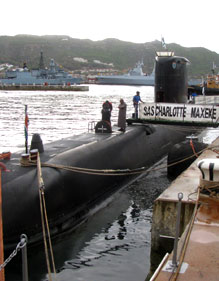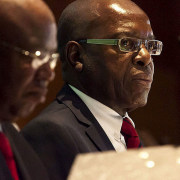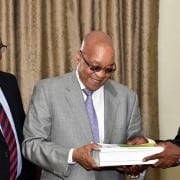|
Getting your Trinity Audio player ready...
|
 By Lee-Ann Alfreds
By Lee-Ann Alfreds
Just 750m apart, two different legal proceedings are underway in the heart of Pretoria. Both are intriguing, will influence the way South Africa is viewed around the world, and have had – to a greater and lesser extent – an impact on the lives of South Africans.
But that is where the similarities end. For while the public gallery in one courtroom on the ground floor of the North Gauteng High Court is packed daily, the public gallery of the Tshwane Council Chamber at Sammy Marks Conference Centre is always empty. While a pool system is in place to accommodate the hundreds of journalists wanting access to courtroom GD, the number of journalists who stop by the media gallery in the Council Chamber can often be numbered on one hand. While the world’s spotlight is being shone on Paralympian Oscar Pistorius’ murder trial, there is no such light on the proceedings of the Arms Procurement Commission, currently investigating fraud, corruption, impropriety and irregularity in South Africa’s 1999 arms deal.
Although the Pistorius trial is no doubt enthralling, the other proceedings have more ramifications for South Africans. For should the Seriti Commission determine that fraud and corruption existed in the R71-billion purchase of submarines, corvettes, helicopters and aircraft, it will shake the very foundation of South Africa. It will prove – as critics have long contended – that the country’s new democratic government wilfully and deliberately jeopardised citizens’ future, spending billions in an exercise that would lead not to jobs and investment, but to large-scale job losses, deepening poverty and a widening social divide.
However, this is not apparent at first glance. While the phalanx of policemen, security guards, gawkers and journalists around the North Gauteng High Court signals something significant is taking place, there is nothing at the Sammy Marks Conference Centre to signal the magnitude of the proceedings occurring inside its environs.
Deceptively humble surroundings
The entrance to the Sammy Marks Conference Centre is inauspicious – takeaway restaurants, a gallery, a short-term loan company, a doctor’s rooms and Doves Funeral Services vie for attention alongside established retailers such as Mr Price, Ackermans and Bradlows.
A table on the first floor outside a set of glass double doors manned by policemen is the only indication that this is more than just a shopping centre. This is where the commissioners, their staff, the legal teams, witnesses, journalists and members of the public have to sign in to gain access to the Tshwane Council Chamber.
The setting too differentiates the proceedings underway at Sammy Marks from those 750m away. In place of a bench, there is a raised podium where Commissioners Willie Seriti and Hendrick Musi preside. There is no dock, no witness stand and no adjacent tables for the defence and prosecution.
The Tshwane Council Chamber is more akin to a lecture room, with witnesses sitting in the centre of the amphitheatre, flanked by the evidence leaders on their right.
Legal teams representing interested parties also sit in the bullring while lawyers and lobbyists for the arms companies sit in the backbenches. It is, in fact, the only aspect where the Arms Procurement Commission outdoes the trial of Pistorius.
Bristling with lawyers, lobbyists and professionals
While the public and media have largely stayed away, the same cannot be said of the lawyers … and lobbyists. At any given time, the commission is teeming with lawyers, often numbering over 20, who work either for the commission itself, or for one of the many interested parties defending the deal.
The state attorney has a team representing all the officials of the departments of Defence and Military Veterans and Trade and Industry, and National Treasury who have been called to testify before it. This includes former president Thabo Mbeki, finance minister Trevor Manuel, defence minister Mosiuoa Lekota and intelligence minister Ronnie Kasrils. Former trade and industry minister Alec Erwin took the stand in February.
A legal team represents the Armaments Corporation of South Africa – better known as Armscor – which oversaw the acquisition of the Strategic Defence Package, while the National Defence Force has also employed its own attorneys to safeguard its interests.
Even critics of the arms deal, the authors Hennie van Vuuren, Paul Holden and Andrew Feinstein, have their own team, led by Lawyers for Human Rights.
But it is the lobbyists, not the lawyers, who have anti-corruption activists riled.
“The lobbyist, paid to report to arms companies in various European capitals, can often be seen engaging in whispering campaigns during breaks, including with the media present,” wrote Feinstein, Holden and Van Vuuren in February. “The intention appears to be that nothing should stick and that facts don’t gain traction.
“It is an unseemly exercise to behold.”
Just as unseemly, ironically, as the facts being revealed 750m away, in the trial that has the world – and South Africans – engrossed.









